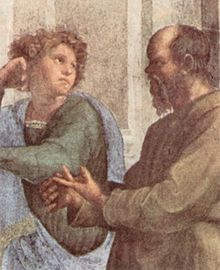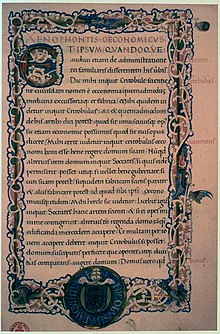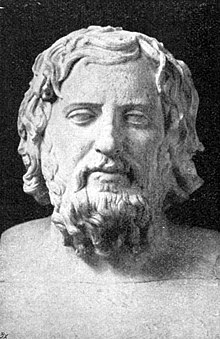Xenophon

Xenophon ( ancient Greek Ξενοφῶν Xenophṓn ; * between 430 and 425 BC in Athens ; † approx. 354 BC in Corinth ) was an ancient Greek politician , general and writer in the fields of history , economics and philosophy . He was a student of Socrates .
Life
What we know today about Xenophon's life is essentially taken from his own works and a third-century book on the history of philosophy.
Xenophon, son of Gryllos, was an Athenian from the Demos Erchia. He came from a wealthy family, presumably from the "knight class", which was more oligarchical in mind. At a young age (between 410 and 401 BC) he became a supporter of the Athenian philosopher Socrates , who, according to an anecdote, blocked his path in a narrow alley and asked him where to buy various foods. After the young Xenophon had answered, Socrates asked him: “And where do people become noble and capable?” Xenophon was startled and is said to have followed Socrates ever since. Even if the acquaintance with Socrates could not have lasted long (Xenophon left Athens in 401 BC, Socrates died in his absence in 399 BC), Xenophon stuck to Socrates and wrote dialogues a long time later in which Socrates was the main actor Has conversations with others.
In 402 BC The Greek Proxenus of Thebes was commissioned by the Persian Prince Cyrus to recruit Greek mercenaries for a campaign, whereupon he invited Xenophon, along with others, to the army camp in Sardis . Xenophon reports that he was undecided, since Athens was certainly not welcomed for Athenians to enter the service of the Persians, especially since Cyrus had sided with the enemy Sparta in the Peloponnesian War . He therefore decided to travel to Delphi and consult the oracle there. Xenophon said that he himself asked the question in such a way that the answer he received was not whether he should travel, but only which gods he should turn to in order to survive the journey safely. So he traveled in 401 BC. In the Achaemenid Empire .
Xenophon accompanied the Greek part of the so-called "train of 10,000" initially as a civilian without a military function. The leader Cyrus fell in 401 BC. In the battle of Kunaxa . The army disbanded and the Greek mercenaries had to try to make their way to the sea on their own. When their leader, Proxenus von Thebes, also fell, Xenophon, whose voice had already gained more and more weight, was elected as the new commander, but said he declined the function. Xenophon came with the army to the Black Sea and finally Byzantium by Pergamon .
In the following years Xenophon, undesirable in Athens, joined the Spartans and their army led by Agesilaus . They then gave him an estate in Skillus , to which he retired with his wife Philesia and two sons in the 380s. There he took care of the economy and devoted himself to spiritual activities. During this time the historical works Anabasis and Hellenika were created , as well as an economic writing and philosophical dialogues. 371 BC BC Skillus fell, however, and Xenophon's family moved to Corinth . In 367/366 Athens' exile judgment on Xenophon was lifted, whereupon, as one can only assume, he returned to Athens after 35 years, but then, according to Diogenes Laertios, died in Corinth.
We don't know much about relationships with other Socratic students - but he is said to have had a bad relationship with Plato and Aristippus of Cyrene . Diogenes Laertios attributes it to a rivalry between the two philosophers that both Xenophon and Plato wrote a banquet and a speech in defense of Socrates . Furthermore, one wrote moral treatises, the other his memorabilia , and Plato dismissed the education of Cyrus (there is a work by Xenophon on it) as fiction. Some researchers find numerous reminiscences of Plato's dialogues in Xenophon's memorabilia .

Aftermath
Xenophon's works, especially the Socratic writings and the Anabasis , were popular because of their sober, clear language (he was read and praised by Marcus Tullius Cicero , among others ); he remains an important style model for Attic Greek to this day. Since Xenophon was partially eyewitness to the reported events, he is also an important source for the Greek history of the 4th century BC. And has recently aroused the interest of research. It is also of importance for the history of philosophy as a critical complement to the representation of Socrates in the works of Plato . His works Hipparchikos and Über die Reitkunst are now widely seen as the basis of hippology . The information to be found there is still valid today.
Xenophon also thought about the economy , which he recorded mainly in two books: Oikonomikos (conversation about housekeeping) and De Vectigalibus (ways and means of raising money for the state). In these he deals with the principles of good housekeeping on the one hand and the Athens economy on the other. Tomáš Sedláček sees these works as the very first stand-alone textbooks on micro- and macroeconomics.
In addition, Xenophon dealt with subjective value theory and the assignment of work in the polis .
Portraits
Four replicas of a non-preserved original portrait have been preserved. One of these replicas, a Herme discovered in Cairo in 1940 , is now in the museum in Alexandria. The origin of the original can be traced back to the years 335 to 330 BC. Estimated when Xenophon had already died.

Fonts
As in the case of Plato , it is assumed that all of Xenophon 's writings have survived. As with Plato, it is also assumed that not all of the writings handed down under his name actually come from Xenophon. This includes the state constitution of the Athenians and probably also the treatise on hunting . Über Theognis and the Xenophon letters are certainly inauthentic . The following classification of Xenophon's 15 writings follows that of Klaus Döring :
Historical writings
- Anabasis , The March of Cyrus into the Highlands (autobiographical report on the "train of 10,000" into the Persian Empire and back)
- Hellenika , History of Greece (from 411 to 362 BC, direct connection to the work of Thucydides )
- Agesilaos (eulogy of the Spartan king Agesilaos)
Socratic writings
- Memorabilia , memories of Socrates
- Symposium , banquet (philosophical-literary dialogue during a banquet)
- Apology , defense speech of Socrates (hypothetical defense speech of the accused Socrates in court)
- Oikonomikos , housekeeping
Educational and Political Writings
- Kyrupädie , education of Cyrus (text for political education about the Persian great king Cyrus II, portrayed as the ideal ruler )
- Hieron (dialogue about tyranny )
- Poroi , On Government Income (Fundraising Opportunities for the City-State of Athens)
- State constitution of the Lacedaemonians (description of the Spartan constitution and way of life he valued )
Further
- Hipparchikos (treatise on the duties of a cavalry commander)
- About the art of riding
- Kynegetikos , Treatise on Hunting
- State constitution of the Athenians [probably does not come from Xenophon in reality, see Pseudo-Xenophon ]
Complete editions and translations
Total expenditure
- Edgar Cardew Marchant (Ed.): Opera omnia. 5 volumes, Oxonii E Typographeo Clarendoniano, Oxford 1900–1920 (reprints exist)
- Volume 1: Historia Graeca , 1900 ( archive.org )
- Volume 2: Commentarii, Oeconomicus, Convivium, Apologia Socratis , 1901 ( archive.org )
- Volume 3: Expeditio Cyri , 1904 ( archive.org )
- Volume 4: Institutio Cyri , 1910 ( archive.org )
- Volume 5: Opuscula , 1920 ( archive.org )
- Christian Nathanael Osiander , Gottlieb Lukas Friedrich Tafel , Gustav Schwab (Hrsg.): Xenophon's of Athens works . In: Greek prose writers in new translations , JB Metzler, Stuttgart 1827–1828 ( new edition 1943 )
Translations of individual writings
- Rainer Nickel (Ed.): Kyrupädie. The education of Cyrus , Greek-German, Artemis and Winkler, Munich 1992.
- Walter Müri , Bernhard Zimmermann (Ed.): Anabasis. The train of ten thousand , Greek-German, Artemis-Verlag, Munich 1990.
- Gisela Strasburger (Ed.): Hellenika. Greek-German, 2nd edition, Munich 1988.
- Ernst Bux (Ed.): The Socratic Writings , Kröner, Stuttgart 1956.
- R. Baer (ed.): Xenophons Apologie des Sokrates. German-Greek, Bär, Niederuzwil 2007.
- Ekkehard Stark (Ed.): Das Gastmahl , Greek / German, Reclam, Stuttgart 1986.
- Georg Peter Landmann (Ed.): Das Gastmahl , Rowohlt, Hamburg 1957.
- Anabasis. Hellenika. Memories of Sokrates , Emil Vollmer Verlag, Wiesbaden undated (licensed edition of the translations of Müri, Strasburger and Järisch).
- Leo Strauss : About tyranny. An interpretation of Xenophon's “Hieron” with an essay on tyranny and wisdom by Alexandre Kojève, Luchterhand Verlag, Neuwied and Berlin 1963. (translation and interpretation).
- Socratic Memorabilia , in Christoph Martin Wieland's translation with its explanations, introduced with an essay by Jan Philipp Reemtsma , Frankfurt am Main: Eichborn 1998, series Die Andere Bibliothek .
- Kai Brodersen : Xenophon: Ross und Reiter , Greek / German, Tusculum, de Gruyter, Berlin 2018, ISBN 978-3-11-059562-8 (Hipparchikos and Peri Hippikes)
- Kai Brodersen: Xenophon / Arrianos: hunting and hunting dogs. Greek / German, Tusculum, de Gruyter, Berlin 2018, ISBN 978-3-11-059563-5 (Kynegetikos)
literature
Manuals, encyclopedias
- Hans Rudolf Breitenbach : Xenophon of Athens. In: Paulys Realencyclopadie der classischen Antiquity Science (RE). Volume IX A, 2, Stuttgart 1967, Sp. 1569-2052 (also published as a monograph: Druckermüller, Stuttgart 1966).
- Klaus Döring: Xenophon. In: Hellmut Flashar : Outline of the history of philosophy . The philosophy of antiquity . Volume 2/1, Schwabe, Basel 1998, ISBN 3-7965-1036-1 , pp. 182-200.
- Louis-André Dorion, Jörn Lang: Xénophon d'Erchia. In: Richard Goulet (ed.): Dictionnaire des philosophes antiques. Volume 7, CNRS Éditions, Paris 2018, ISBN 978-2-271-09024-9 , pp. 227-290.
- Bernhard Zimmermann , Antonios Rengakos (Hrsg.): Handbook of the Greek literature of antiquity. Volume 2: The Literature of the Classical and Hellenistic Period. CH Beck, Munich 2014, ISBN 978-3-406-61818-5 , pp. 284-289 (Michael Erler on Xenophon's philosophically relevant works), pp. 623-631 (Carlo Scardino on Xenophon's historiography), pp. 586-589 ( Sabine Föllinger on economic works), p. 700 f. ( Stefan Schorn on the Agesilaos )
- Boris Hogenmüller : Xenophon from Athens. In: Biographisch-Bibliographisches Kirchenlexikon (BBKL). Volume 33, Bautz, Nordhausen 2012, ISBN 978-3-88309-690-2 , Sp. 1537-1546.
About Xenophon in general
- John K. Anderson: Xenophon . London 1974.
- William Edward Higgins: Xenophon the Athenian. The Problem of the Individual and the Society of the Polis . State University of New York Press, Albany 1977.
- Christian Mueller-Goldingen : Xenophon. Philosophy and history . Scientific Book Society, Darmstadt 2007.
- Rainer Nickel: Xenophon . Scientific Book Society, Darmstadt 1979.
- Rainer Nickel: Xenophon. Life and work. Tectum, Marburg 2016, ISBN 978-3-8288-3738-6 ( specialist review by H-Soz-Kult ).
- Christopher Tuplin (Ed.): Xenophon and his World. Papers from a conference held in Liverpool in July 1999 (= Historia Einzelschriften . Volume 172). Steiner, Stuttgart 2004.
On special topics
- John Dillery: Xenophon and the History of his Times . Routledge, London / New York 1995.
- Robin Lane Fox (Ed.): The Long March: Xenophon and the Ten Thousand . New Haven / London 2004.
- Otto Lendle: Commentary on Xenophon's Anabasis. Books 1-7 . Darmstadt 1995.
- Christian Mueller-Goldingen: Xenophons Memorabilia. In: The small and the big, essays on ancient culture and intellectual history. Munich / Leipzig 2004.
- Christian Mueller-Goldingen: Investigations into Xenophons Kyrupädie . Teubner, Stuttgart 1995.
- Paul Klimek : Critical Studies on Xenophons Memorabilia . Part I. Printed by R. Nischkowsky, Breslau 1907. - Part II . Printed by R. Nischkowsky, Breslau 1912.
- Sarah B. Pomeroy: Xenophon - Oeconomicus. A Social and Historical Commentary . Oxford 1994.
Web links
- Literature by and about Xenophon in the catalog of the German National Library
- Works by and about Xenophon in the German Digital Library
- Works by Xenophon in the Gutenberg-DE project
- Eve A. Browning: Xenophon (430-354 BCE). In: Internet Encyclopedia of Philosophy .
- Works in English translation
- Xenophon's importance for the art of riding
- Digitized version of a school edition of the Anabasis from 1912
Remarks
- ↑ Life data according to Klaus Döring: Xenophon. In: Hellmut Flashar: Outline of the history of philosophy. The philosophy of antiquity. Volume 2/1, Schwabe, Basel 1998, pp. 182-200, here: pp. 183, 185.
- ↑ Diogenes Laertios, On the Life and Teachings of Famous Philosophers 2, 48–59.
- ^ Klaus Döring: Xenophon. In: Hellmut Flashar: Outline of the history of philosophy. The philosophy of antiquity. Volume 2/1, Schwabe, Basel 1998, pp. 182-200, here: p. 182; Hans Rudolf Breitenbach: Xenophon of Athens. In: Pauly-Wissowa. 2nd series, volume 9. Stuttgart 1967, Sp. 1571ff.
- ↑ Diogenes Laertios, On the Lives and Teachings of Famous Philosophers 2.48.
- ↑ See Hans Rudolf Breitenbach: Xenophon von Athen. In: Pauly-Wissowa. 2nd row, volume 9. Stuttgart 1967, 1569ff., Here: Col. 1573.
- ↑ Diogenes Laertios, On the Lives and Teachings of Famous Philosophers 2.48.
- ↑ a b c Xenophon, Anabasis 3.1.4 to 3.1.7 .
- ↑ Xenophon, Anabasis 6,1,18 to 6,1,31.
- ↑ Diogenes Laertios, On the Lives and Teachings of Famous Philosophers 2.56.
- ^ Klaus Döring: Xenophon. In: Hellmut Flashar: Outline of the history of philosophy. The philosophy of antiquity. Volume 2/1, Schwabe, Basel 1998, pp. 182-200, here: pp. 184f.
- ↑ Diogenes Laertios, On the Life and Teachings of the Philosophers 2.57 and 3.34.
- ↑ a b Diogenes Laertios, On the life and teachings of the philosophers 2.65.
- ↑ Xenophon, Memorabilia 4,5,11 to 4,5,12 and 4,6.
- ^ Klaus Döring: Xenophon. In: Hellmut Flashar: Outline of the history of philosophy. The philosophy of antiquity. Volume 2/1, Schwabe, Basel 1998, pp. 182-200, here: p. 185.
- ^ Tomáš Sedláček: The economy of good and bad . Hanser, Munich 2012, ISBN 978-3-446-42823-2 , p. 238.
- ^ Klaus Döring: Xenophon. In: Hellmut Flashar: Outline of the history of philosophy. The philosophy of antiquity. Volume 2/1, Schwabe, Basel 1998, pp. 182-200, here: p. 182.
- ↑ E. Minakaran-Hiesgen: Investigations into the portraits of Xenophon and Isokrates. In: Yearbook of the German Archaeological Institute. Volume 75, 1970, pp. 112-157.
- ↑ This section follows: Klaus Döring: Xenophon. In: Hellmut Flashar: Outline of the history of philosophy. The philosophy of antiquity. Volume 2/1, Schwabe, Basel 1998, pp. 182-200, here: p. 186.
- ↑ archive.org
- ↑ archive.org
| personal data | |
|---|---|
| SURNAME | Xenophon |
| ALTERNATIVE NAMES | Xenophon from Athens |
| BRIEF DESCRIPTION | Athenian writer and historian |
| DATE OF BIRTH | around 426 BC Chr. |
| PLACE OF BIRTH | Athens |
| DATE OF DEATH | after 355 BC Chr. |
| Place of death | Corinth |
